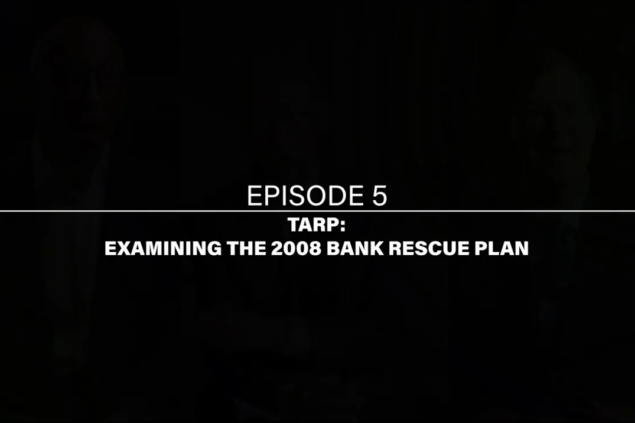Deep Dive Episode 185 – SEC v. Ripple Labs: Cryptocurrency and “Regulation by Enforcement”

In recent years, a number of regulatory agencies have increasingly utilized enforcement actions rather than formal rulemaking to achieve desired policy outcomes. Critics argue that this “regulation by enforcement” raises legal concerns involving fair notice, the rule of law, and the Administrative Procedure Act. One prominent example of this phenomenon is the regulation of the cryptocurrency industry, where explosive innovation and growth have left many players appealing for clear rules of the road, rather than unpredictable enforcement actions carried out by a variety of federal agencies, including the Securities and Exchange Commission (SEC), the Commodity Futures Trading Commission (CFTC), and the Financial Crimes Enforcement Network (FinCEN).
While the SEC has declared that Bitcoin and Ether, the two largest cryptocurrencies, are not securities, the agency has increasingly brought lawsuits arguing that other coins must be registered as securities, relying on New Deal-era statutes and the Supreme Court’s 1946 Howey test. Most notably, the SEC recently filed suit against Ripple Labs claiming that XRP, the popular cryptocurrency Ripple launched almost a decade ago, is an unregistered securities offering.
In this live podcast, an expert panel discusses SEC v. Ripple Labs, the broader cryptocurrency regulatory landscape, and potential legislative and regulatory reforms.
Transcript
Although this transcript is largely accurate, in some cases it could be incomplete or inaccurate due to inaudible passages or transcription errors.
[Music and narration]
Introduction: Welcome to the Regulatory Transparency Project’s Fourth Branch podcast series. All expressions of opinion are those of the speaker.
Jack Derwin: Hello and welcome to The Regulatory Transparency Project’s Fourth Branch Podcast. My name is Jack Derwin, and I’m Assistant Director of RTP at The Federalist Society. As always, please note that all expressions of opinion are those of the guest speakers joining us today.
To learn more about our speakers and their work, you can visit RegProject.org to view their full bios. After opening remarks and discussion between our panelists, we’ll go to audience Q&A. Please enter any questions into the Q&A or chat functions and we’ll address them as time allows.
This afternoon, we’re pleased to host a conversation titled “SEC v. Ripple Labs: Cryptocurrency and ‘Regulation by Enforcement.’” To discuss this topic, we have a terrific five-person panel.
John Berlau is a senior fellow at the Competitive Enterprise Institute and the author of George Washington, Entrepreneur: How Our Founding Fathers Private Business Pursuits Changed America and the World. John Deaton is managing partner at Deaton Law Firm. Carol Goforth is University Professor and Clayton N. Little Professor of Law at University of Arkansas School of Law. Roslyn Layton is the founder of China Tech Threat, a visiting researcher at Aalborg University Center for Communication, Media, and Information Technologies, and a senior contributor at Forbes. And our moderator today, Curt Levey, is president of the Committee for Justice.
With that, Curt, I’ll turn things over to you.
Curt Levey: Thank you, Jack. At the highest level, what we’re going to talk about today is regulation by enforcement. That’s where regulatory agencies substitute enforcement actions for rulemaking. Now, there’s nothing wrong with enforcement actions by federal agencies in general. The problem occurs when it’s done in the absence of regulatory or legislative rules or guidelines. And that raises issues involving fair notice, the rule of law, Administrative Procedure Act, a number of other things.
Perhaps the best example of this phenomena is the regulation of the cryptocurrency industry. Because that industry has exploded onto the scene and grown so quickly, there are few clear rules of the road at this point, yet there have been a bunch of enforcement actions by a variety of federal agencies, including the SEC. The most prominent one to date is the SEC’s recently filed suit against Ripple Labs. Ripple launched XRP, one of the most popular digital coins, almost a decade ago, and the SEC now alleges that XRP is an unregistered security. Roslyn, who you’ll hear from, has called the Ripple suit the cryptocurrency trial of the century.
Our panelists, all of whom are experts on crypto reg, will talk about all of this, the problem of regulation by enforcement, crypto regulations specifically, SEC v. Ripple Labs in particular. They’ll discuss the effect of all of this on American innovation and competitiveness. They’ll talk about potential legislative and regulatory reforms. And I suspect there’ll be plenty of disagreement, especially over the Ripple suit and whether XRP is a security.
I’ll try my best to be an impartial moderator. If you want to know my views, I had a recent piece about this topic on The Federalist Society blog. You can look there or reach out to me after the panel. But for now, we’ll focus on the panelists, so let’s start with John Deaton.
John Deaton: Thank you very much, Curt, and thank you for having me. The theme is regulation by enforcement, and as Curt said, no better example today exists, in my opinion, of different government agencies engaging in this practice within the digital asset or cryptocurrency space. For example, we have just a few agencies, FinCEN, the Financial Crime Enforcement Network, CFTC, SEC. All of these agencies and more are involved. And in my opinion, because of the lack of regulatory clarity, each one of these agencies has its greedy paws in the crypto pot, or I would call it the crypto jackpot.
Now, as Curt said, digital currency is probably the hottest topic in global trade and finance today. November of 2020, President Xi of China came out and said at the G20 summit that it was the top priority of the Chinese government to develop a central bank digital currency. We don’t have to look any further than a few weeks ago when El Salvador, the country, actually enacted Bitcoin as a sovereign currency along with the U.S. dollar.
Now, that’s what’s going on in the rest of the world. What’s going on in the United States? Well, we’re taking a different approach here. And what we have, there’s no better example of the interplay of these different agencies than the Ripple XRP case. Everyone should know that, for example, in 2015, the Department of Justice and FinCEN sued Ripple Labs because it had not registered as a money transmitter company, and it declared XRP not a security but, quote, “convertible digital currency.”
I actually have the binding contract between the United States government and Ripple in front of me, and it says, quote, “any sale or transmission of XRP by Ripple Labs or its subsidiaries shall be concluded only through an entity registered with FinCEN,” end quote. The lawyers that are listening will take note of the shall word, and the only word that’s pretty conclusive. Now, of course, there’s one sentence provision in there that just says, oh, you also have to comply with the other laws of the United States, including with the SEC.
But even though that happened in 2015, five and a half years later, seven and a half years after XRP was introduced to the public market, the SEC decided that not only is XRP a convertible digital currency, that it’s actually an unregistered security. Except they did something very extraordinary, in my opinion, in the case. They didn’t claim that in 2013 to 2015 on a particular transaction at a particular time that that transfer was an unregistered security. No, they said, going back seven and a half years, all XRP traded, including in the secondary markets between people that have never heard of this company called Ripple, all XRP constitutes an investment contract of the company Ripple. Extraordinary.
In 2017, there was an aggressive enforcement actions. They’re called the ICO era where the SEC went after companies who engaged in initial coin offerings where they would do a fundraiser publicly and then use that money and those funds to develop the blockchain. That’s not how Ripple started or how XRP started. It’s been going on for years and years.
The SEC, however, took this approach that said for seven and a half years, Ripple has been engaged in a public offering. Now, that’s unique because 18 months prior to the lawsuit, they granted permission for Ripple to buy 9 percent of MoneyGram, knowing that XRP would be traded or distributed by Ripple to MoneyGram, and they didn’t do anything about it.
In 2019, Coinbase, we know, went to the SEC and said, “Hey, we’re thinking about listing this XRP. And you all have come out and said Bitcoin and Ethereum’s not a security, but we just want to make sure. We don’t think XRP is a security. We just want to make sure that we’re complying with the law.” SEC does not dissuade them. They go on to list it, and again, a year and a half later, the SEC changed its mind because on the last day of former chairman Jay Clayton’s tenure as SEC chairman, he decided to direct this law suit, file it.
As Roslyn said in an article, she called it the cryptocurrency trial of the century. I’m on record as saying it is the most significant SEC enforcement action in modern history since the 1946 seminal case of SEC v. W. J. Howey.
Now, when I’m done—and I’m running up on my time, and I want to be respectful to the other panelists—is that I have 18,000 XRP holders knocking on the door of the Southern District of New York asking to intervene, or at a minimum, be heard as amicus with participatory rights because I have thousands of people — I have hundreds of people that get paid in XRP. They get paid in XRP. They use their XRP debit card to buy their groceries, their bread, their milk, their gas. Time magazine accepts XRP. They’re not using it as an investment. It’s used as consumptive use in many, many cases, and that’s being ignored by the SEC.
And the final comment I would say before I turn it over to the panelists is that the SEC and others have said, “Well, Ripple, the people behind Ripple, they created XRP. And but for their efforts, then that’s led to the success of XRP.” Well, that would be the same thing as saying that Bitcoin’s success is attributed to Satoshi Nakamoto who invented it, or that Ethereum’s success is attributed to Vitalik Buterin who cofounded it and was the director of the Ethereum Foundation.
And so my issue is that they did not limit it into the early periods of time when it could be arguably claimed credibly to be a security and instead took this credible overreach to claim that the XRP that’s in thousands of accounts across the world, or hundreds of thousands, actually, I think it’s over 2 million now, accounts across the world that those people who bought in on Coinbase or these other exchanges, that what they hold is an unregistered security. I continue to say that that is an absurd claim. Thanks.
Curt Levey: Thank you, John. Carol, I’d like to hear your perspective.
Prof. Carol Goforth: Hi, everyone. I’m pleased to be with you today. I actually take the position that the SEC’s decision to initiate an enforcement action against XRP, while unfortunate in terms of its timing, is perfectly justified, not under new law, but under law that dates back to 1933 and 1946.
When the Securities Act of 1933 was passed, the definition of security was written as including something called investment contract that was defined by the U.S. Supreme Court in 1946 to include any interest where there is an investment of something of value, whether that is where people are paying in money or other valuables, and a common enterprise, that is where their fortunes all rise and fall together, with the expectation of profits based on the efforts of others. And in fact, that has been the approach that the SEC has taken with regard to figuring out when and whether crypto assets are securities.
In the promotional materials for this particular webinar, it was claimed that the SEC has said that Bitcoin and Ether are not securities. And actually, that’s not true. Bill Hinman and Jay Clayton, in various speeches while they were associated with the SEC, made statements to the effect that in their opinion, those had become so decentralized that there was no longer any one person or group upon whom you could rely to determine value.
So while Satoshi Nakamoto absolutely would have been the original creator of value for Bitcoin, at the current time no one even knows who that is. And it is impossible to point your finger at any one group and say, “Ah ha, that’s the person that is controlling the value of Bitcoin.”
Ethereum, the only person who actually came out and said that in his opinion, it was sufficiently decentralized, that you couldn’t point to the profitmaking potential of a particular group, was Bill Hinman, and he’s no longer with the SEC. So I’m not even certain that Ether is safe, although it is so decentralized, and the Ethereum Foundation is not actually the issuer. It’s sort of this group of volunteers that go about trying to promote value for the community. So I think there’s a good argument there that it doesn’t meet the Howey test.
I don’t think there’s nearly as good an argument for the XRP token. When the XRP token is issued, yeah, there are all kinds of potential uses for that token, and the SEC hasn’t taken a single one of those away. You want to go out and buy milk with it, buy milk with it. You want to go out and use it to facilitate international banking transactions, use it to facilitate international banking transactions.
What the SEC is saying that many of those 18,000 people that are clamoring to join the litigation against the SEC, the reason they bought XRP is that they expected Ripple to go out and to continue to push up the value of that token so that it would be a speculative, profitable investment. And it is something that people put money into, or invested other forms of crypto, or invested labor in. It’s a common enterprise. Everybody’s interest in the XRP rises or falls together. And it is something where they are expecting profits from the efforts of Ripple. And that makes it a security.
Now, is it fair for the SEC to wait nearly ten years? Oh, absolutely not. It was terrible timing. It’s not something that I defend. I’m appalled that they would wait so long to act. But is it illegal? Is it unconstitutional? Does it amount to unfair behavior? I don’t think so.
And if you take a look at our current SEC chairman, Gary Gensler, back in 2018, he said that in his opinion that XRP was an unregulated security. He has also said that he thinks the way to proceed is for Congress to get involved. And so I think there is a very strong need for legislative intervention here.
I don’t think that the bills that are pending like the Token Taxonomy Act that would say that all digital tokens are not securities is the way to go because some of these are fraudulent, and it is really important that we do have a federal regulator who’s out there with sufficient resources to come after fraudulent issuers. I’d be much more in favor of a federal legislation that said something like it’s all securities, but there are really generous exemptions that ought to be available for companies that try to comply.
I will also note that just because it was a currency and required to be registered with FinCEN doesn’t mean it’s not a security. Securities brokers and dealers also register with FinCEN under the requirements to FINRA. We have a mixed bag of regulations. We have an unfortunate set of regulations, but they are what they are. And under the law as it is currently written, I believe it is a security.
And with that, I will turn my time over.
Curt Levey: John Berlau, what are your thoughts?
John Berlau: Well, Curt, thank you so much for having me here, and I’m so honored to be here with all these distinguished panelists. As was said in my introduction, I study financial regulation, but I’ve also written a book called George Washington, Entrepreneur about his various business ventures. And it’s including mule breeding, whiskey distillery, all of these things. And it’s just interesting because you see historical antecedents, and history doesn’t repeat itself, but it rhymes.
And in Washington’s day, you had tobacco warehouse receipts, receipts that were good for tobacco, being actually used for money. People would use it not just for tobacco, but as a way of paying each other, having that they were actually called tobacco notes. And I like to do that. I like to look at different antecedents for industries and look at how rules would be applied to different industries.
And I think if you do that, if you were to say with — look at, say, what if the FDA did to hamburger joints what the SEC did to Ripple, it really helps you see the outrage. Imagine Wendy’s, which is — Wendy’s, I think is third, and before the SEC action, XRP was third, I think it was still, as far as cryptocurrency. I think even now it’s still seventh when you get on worldwide.
What if a bureaucrat at the FDA, USDA, decided that one of the ingredients in hamburgers is dangerous, like sodium? There’s some options. We can go to — Congress doesn’t give the authority — we don’t think Congress does give us the authority. We can go to Congress and ask for that authority. We can do a rulemaking, get public comment on it as to whether we have the authority and whether the research justifies being able to ban that ingredient.
Or we can just way, well, even though you’ve been around for so many years and passed health department exams, just like XRP did with the bit license from New York, and you have millions of customers, we think what you’re selling is illegal under the law. It’s dangerous. It’s addictive, so it’s a drug, and therefore, it’s always been illegal. So you have to stop selling this, and we’re going to give you millions of dollars in fines. I think you’d get a reaction that maybe that just wasn’t fair.
And indeed, when the FDA decided to ban trans fat, they didn’t just go out and say, all right, trans fat has always been illegal. It’s always been a dangerous food additive that we have the power — they conducted a review, and they sought public comment, and they gave time for the trans [inaudible 21:15] in China and increase, maybe not to the extent, but to us to just shut down a product that had been the third highest selling product that was not illegal, and there was no fraud allowed.
And I’m glad Carol made the point that not even Bitcoin or Ethereum are—I guess the coin is called Ether. It’s the Ethereum blockchain. I get caught on that—are safe because I think the question with the SEC’s aggressive stance in saying basically that anything that can be resold and can be an investment of value is a security. It’s not what is a security but what isn’t a security.
Now, I’m looking at a statement from the SEC, a guidance document they did in 2019, I think the one that Commissioner Hester Peirce compared to the Jackson Pollock painting. It says there may be securities transactions if, dot, dot, dot, there are limited or no restrictions on reselling those digital assets. And then I looked at what Jay Clayton, former Chairman Clayton, who, as John Deaton said, did this the last day, that wrote to Ted Budd, and he said that the SEC was simply carrying out federal securities laws that, quote, “defined security broadly to encompass virtually any instrument that may be sold as an investment.”
Now, think about that. If something that you can resell is a security, and if something that has investment value or that is promoted as investment value is a security, then a lot of things could possibly be classified as securities. I can think of artwork, wine, those are all bought and sold for investment value, sold to third parties. In the digital space, there are points, frequent flier miles that are sold on points.com that can resell. Are those securities? And sometimes even comic books are promoted as, say, this is a special collector’s edition, or in my case with books, this is a first edition. Companies will say that.
Now, are those securities simply because they have investment value, or they can be resold in different markets? So it’s just — in fact, Carol gives examples of some things like coins and other things, and that should — that’s actually a scary precedent. But the SEC in those days never — I don’t think made a sustained attack like they are in cryptocurrency, so I think this is going to lead or should lead to courts putting in some limits.
And there have always been some limits about what has been considered a security, although they haven’t been very carefully defined. The Supreme Court in the Forman case in the ’70s said that cooperative apartments are not securities. And even within Howey, they were more talking about the shares in the orange groves and not the oranges themselves. And I think there is a case that the crypto currency here is the product rather than having qualities like ownership shares or the promised return on investment.
There’s an important word in Howey, I think, when it says is based on the — with profits to come solely from the efforts of others, and that is the world “solely.” Now, lower courts have not always gone beyond solely and said it can just come from the efforts of others. But I think that’s a very important distinction. And as far as I know, the Supreme Court has never ruled on that point about whether if something that is not solely like it was with the orange groves and Howey and the people with the service contracts, whether that would count as a security.
And that’s a very important distinction because, to go back to comic books, you could say a comic book becomes valuable as an investment because in the days when the great Stan Lee was here, well, Stan Lee made your Spiderman comics go up in value because he negotiated a movie, and so that was a — but your comic books didn’t come solely from the efforts of him. There was an independent market. They had utility, other things.
So I think it is important for the courts to, either within the Howey framework or outside of it, or to rule that Howey is — it’s been 70 years and there might be some new tests. But even within Howey, I think the courts can put in some limits.
And I think it’s very important for either the courts or Congress to do so or else we could see that this great vacuum, this great securities vacuum where everything could be a security, and that given the bipartisan agreement of the difficulties in securities registration and how it’s hurting small public companies that led to reforms such as the Jumpstart Our Business Startups Act signed by President Obama, that’s something we don’t want. So if you’re not into crypto, think about what the SEC’s justification for going after crypto could lead to.
And again, I’m honored to be speaking here.
Curt Levey: Thank you, John. Last, but certainly not least, Roslyn.
Roslyn Layton: Well, good afternoon. Thank you. I want to thank FedSoc and RTP for this invitation. Greetings to our wonderful audience. I believe we have a groundbreaking attendance of over 550 today. So pleased that so many want to engage in our discussion.
Obviously, you’ve had some very helpful details laid out in this case. My goal is to provide an overview of this topic from the academic perspective of economic regulation. And the Securities and Exchange Commission is quite significant because it was studied by the Nobel Prize economist George Stigler decades ago. He was famous for coining the term regulatory capture. Now, regulatory capture is the economic theory that regulatory agencies will come to be dominated by the interest they regulate, not necessarily the public interest, consumers, or voters. And that’s quite significant when we look at the rather unseemly conflicts of interest of former SEC leaders and then this particular case.
In any event, Stigler’s groundbreaking study documented how the SEC in the first 30 years of its life engaged in misinformation to justify further intervention in the market. Now, for a FedSoc audience, you can appreciate George Stigler as a very important economist in what we call the heterodox school. He really was interested in finding out what is the real economic and financial impact of regulation rather than just accepting the premise that regulation achieves its stated purpose. And he pioneered this very important field of empirical inquiry and has been giving this intellectual ballast to the question of the validity of the administrative state, something that I think is so important to the work that FedSoc does.
So we’re not going to give investment advice on this call, but I will say one thing. I was a securities broker early in my career and went through this. But there’s a notion here that the SEC is there to protect you as an investor, but what I would say as an economist is that the de facto work of the SEC is to perpetuate its power and to serve the salient stakeholders, whether that is some established industry, the internal interests of Swift, or competing cryptocurrencies that perhaps the leaders of the agency may prefer. Perhaps they see Ripple as a threat, and so forth.
I think this is well detailed in Mr. Deaton’s complaint showing how there were payments — there were clients in other — prior to coming to the SEC that they had been legal law clients in other fields that were competitors to Ripple and XRP. So this is definitely a bad look for the SEC. And what Stigler was pointing out that these things are not just bad for capital formation, but there’s a downstream impact to other industries that are relying on the capital inputs.
So where are you today if you’re Ripple, if you’re a fintech startup? The SEC is a gatekeeper. It’s a very powerful regulatory agency with a budget of $2 billion, 43,000 employees, and 87 years of history which gives it a lot of deference in the courts.
Now, from my personal perspective, I have a beef with the SEC that it purports to protect consumers and safety and so on, but what I look at is its treatment of Chinese state-owned securities. As a bipartisan United States-China commission pointed out, in October of last year there were over 217 Chinese companies listed on the three major U.S. exchanges. Just six months later, it’s up to almost 250, some $2 trillion. These are explicitly Chinese state-owned enterprises. They do not comply or fulfill the requirements that American companies have to do to comply when they go on stock exchanges. U.S. companies cannot list in China, for example.
So we have a complete set of double standards which makes it very unsafe for American investors to engage in these kinds of securities. And the SEC itself had admitted this. And there has been this attempted process to clean up this effort, but it’s gone on for a decade. So when I look at the hammer on this startup, an American company at that, that gets held to a totally different arbitrary standard, and yet we let hundreds of Chinese state-owned companies run roughshod over American law, I really have to ask you — I don’t believe that the SEC’s acting in the consumer interest here.
I’m delighted today that RTP is hosting this conversation. I write about this issue on Forbes. I do try to highlight these challenges and problems of regulatory asymmetry, this arbitrary regulation, arbitrary enforcement. And what I would like to suggest is that we need a durable way to keep the SEC in check. And what I’m proposing is we need a Ripple test for the SEC. And in many respects, this is coming from the lawsuit from John Deaton and the 18,000 holders of XRP. And thank goodness we have the capability in the U.S. The courts are the backstop in this case, and we can see that the SEC itself is on trial. Its very credibility is at stake.
We have seen consumers and investors materially hurt by this action, losing billions of dollars in value. Many exchanges have stopped listing the XRP currency, so because of the no notice in announcement, let’s conduct an investigation, or let’s conduct an inquiry where experts could weigh in, parties could weigh in. It just came out of the blue on the last day of the last administration.
So what I’d say is good luck if you are an entrepreneur. You’d better have an army of lawyers if you want to start a business, and you’re going to have to go against the regulatory gatekeepers. And the unfortunate part here is there’s very little punishment for the regulators when they get it wrong. Let’s say that they make a mistake. They keep their jobs. Companies may lose a lot of money. Investors, that’s too bad for you. You didn’t have the right lobbyist or what have you.
Now, the interesting thing is that if this case is decided in favor of Ripple, this could send a message to SEC to be more modest in future. So I guess I would say I applaud that Ripple has decided to fight this because it’s just one of literally thousands of examples where we see the regulators overstep their authority. From my perspective, if the word cryptocurrency is not in the statute, the SEC has no business regulating it. I think there’s a lot of people in FedSoc who would join me on this textualist approach.
But the other point here — I think the lesson for our listeners today is Americans need to take the administrative state seriously. There is no focus of either party to downsize government. Some may have thought that the last administration was deregulatory, and there may have been some activities, but the size of government has grown. There’s no meaningful effort to reign in the scope of government, the number of agencies, certainly not the SEC. Its budget grew by $100 million in the last budget cycle. So this kind of notion that we’re going to put things in balance again, no party is going to take that on.
Fortunately, we do have groups like Competitive Enterprise Institute. This is one of their key areas. They fight this. They have an amazing effort of listing the literally 10,000 commandments of regulations. But it’s a very tough battle, and it’s very hard, politically, to do.
The other thing to point out here is the cryptocurrency industry has been begging Congress to make a reasonable framework. And that effort has not really gone anywhere. It doesn’t appear that there’s bipartisan support. It’s truly unfortunate because, as was noted at the beginning of the call, the Chinese government is banging on the gates, and not that they’re going to be able to create a better currency or a better design or a better platform, they can win just through the sheer economies of scale and their ability to force the entire country of almost 2 billion people to use a digital currency if that’s what they want to do.
And the U.S. innovators and investors, they miss out on the opportunity to bring the best innovations to market where they’re winning through consumers’ choice. Consumers decide what they believe is the best option. And that market, what our whole, let’s say, American idea is based upon would be that the merit would win or the consumers would choose, that is being precluded here.
So we’ve certainly seen this pattern of regulatory agencies exceeding their authority. Unfortunately, Congress has been slow to act. I will say there have been some people in Congress, Representative McHenry is one, who’ve tried to take some leadership here. There is an all-Democrat cryptocurrency caucus, if I’m not mistaken. But this has to be taken more seriously. I’m delighted to see so many investors, so many XRP holders are trying to get their voices heard. It’s extremely important. I hope that Congress will listen.
And again, I thank RTP for gathering us today, and I look forward to the questions.
Curt Levey: Thank you very much, Roslyn. I’m going to ask a few questions of my own, and then we’ll turn to audience questions, of which there are many. As much as I’d like to ask our guests for crypto investment advice, I’m going to stick to the topic of crypto regulation, and I ask that the audience do the same.
Let me start with a follow-up question for John Deaton. You’ve made a distinction between the original XRP sales and sales on the secondary market which didn’t involve Ripple. Do you see any sort of settlement that makes that distinction?
John Deaton: A possible settlement, but if I get my way — and when I say my way, I mean mine and the 18,000 people with me. If the judge allows us to participate with at least amicus, the first thing I’m going to do is I’m going to file a declaratory judgement asking the court to, as a matter of law, say exactly what Judge Castel said in Telegram. And I encourage all your followers to read that where he said the gram itself is just an alphanumeric code. And same thing with XRP. That’s all it is.
As John pointed out, anything can be schemed and marketed as an investment contract. And Howey stood for that position. It wasn’t the investment contracts. It wasn’t the service contracts. It wasn’t the oranges or the orange groves. It was the scheme of how they designed it. And that’s what was said in Telegram.
And so yes, as a matter of law, XRP itself is an asset. And the CFTC chairman has said that Bitcoin and Ethereum are commodities, and therefore, they cannot make a distinction between that. So if there’s a settlement, it’s going to have to be distinguished between sales by XRP in those earlier years, or even today, potentially, versus the secondary market. And that’s where the whole issue is, is the secondary market.
Curt Levey: Let me ask Carol, even though you to some extent defended the SEC lawsuit, you did admit that the status quo is not a good one. Do you think that appropriate agency rulemaking by the SEC or other agencies would fix the problem, or do we really need a legislative solution here?
Prof. Carol Goforth: I think that appropriate rulemaking could fix the problem, but I don’t think that they have any incentive to do it. I think Roslyn was exactly right that they have undertaken a let’s protect my turf, let’s protect my jurisdiction.
So when John says, oh, this is a commodity, well, that’s right. That’s what Commodities Futures Trading Commission says about crypto. It’s a commodity. And FinCEN says no, it’s a currency. And the SEC says no, it’s a security. And because it gives them bigger tax revenues, the IRS says no, it’s property. And because of the way that the existing, predicate, underlying laws have been written, each of those positions is defensible.
What the SEC did with the current law in filing against Ripple is defensible. Regardless of whether or not you think that we ought to have this broad, amorphous category of investment contracts as a security, and that Howey is too broad and it shouldn’t be expanded in this way, all of the existing case law about what investment contract means fits the way the SEC is doing this. So rather than saying, oh, we need a regulatory rulemaking process to fix it, I really believe we need legislative intervention. And whether or not you call it the Ripple test, I don’t care.
I have seen a number of comments saying, oh, it’s the Token Taxonomy Act. That’s what we want to do. Keep in mind that when we had that ICO boom in 2017, 2018, nearly 80 percent of those were, in fact, fraudulent. And people who put their money in those particular offerings lost it because of bad actors in the space.
It is important that we do have a federal regulator who goes after fraudulent actors, those who engage in false scams and phishing expeditions and pump and dump market manipulation scams. And the SEC is well set up to do that, which is why I think that the approach would be much better to say yes, it’s a security, but for heaven’s sake, exempt these that are done by legitimate businesses because right now, we are in the place of losing our role as being a leader. We are pushing this vital technology offshores, and we shouldn’t be. But it’s not realistic to say regulators, fix it. It is going to take an act of Congress.
Curt Levey: Thanks, Carol. John Berlau, you talked about innovation. Can you say a little more about why the regulatory landscape matters for innovation here?
John Berlau: Yes. I think it’s very important to — you can see the sectors like with Silicon Valley, like other things as far as where you’ve had a system of permissionless innovation while still going after [inaudible 44:09] where you don’t have to go and get the government’s permission when you have a new invention. That’s just fundamental to building new sectors.
And I think it started to — we call these never-needed, but you’ve got things developed like the COVID vaccine and others when you started to relax some of the FDA regulations and just put aside that they’re a risk, and not try to go for zero risk. Plus, the things on a micro level as far as our campaign at Competitive Enterprise for never-needed, just of restaurants in the discovery process when you weigh some of the zoning rules of allowing them to set up these outdoor cafes, have liquor — deliver liquor and deliver alcohol and other things they weren’t allowed to do, restaurants — that was able to help make them through.
So hopefully, we’re arguing against the return of these laws and rules because with the crisis being over, saying they were never needed in the first place. So yes, it certainly does make a difference.
And also, I would say it makes a difference as far as who profits, who gains from innovation. In 1981, before Sarbanes, before Dodd-Frank, before all this red tape, Home Depot went public with just four stores in Atlanta when nobody had heard of it. And ordinary investors could buy stock in Home Depot, and those who did are very wealthy today. They also had a chance to lose money, but they still have that chance now in gambling or the lottery or other things.
But all of this red tape has meant that unicorn companies, starting with Google and Facebook and then with Coinbase, they don’t go public until they’re multi-billion dollar companies, so the middle class doesn’t get those growth stages. And as I had said in my discussion, part of that changed when President Obama and Republican Congress commendably worked together in 2012 for the Jumpstart Our Business Startups Act, the JOBS Act, that you’re seeing some companies going public through equity crowdfunding and other things. But it’s still — because of regulation, we don’t let the middle class participate in that innovation like they used to be able to.
Curt Levey: Thanks, John. Roslyn, you talked about China developing its own coin. There’s talk that the U.S. government will do the same. If so, how would that affect the regulatory landscape?
Roslyn Layton: Gosh, I don’t know. Can you give me another question? I don’t have — I don’t know how to say — I think it would blow everything up. It would be — I welcome the U.S. getting involved, but I just would see World War III somehow. Too many interests want to keep it the status quo. It would upset too many apple carts. Can I comment on something else?
Curt Levey: You know what, let’s turn — we only have about 12 minutes left, and we have many, many dozens of questions between the Q&A and the chat, so let me turn to that. One of the first questions is from someone who says justified timing — the day before Clayton leaves the SEC, you called that justified timing. I guess I’ll first direct that at Carol, but anyone can address it since Carol is at least somewhat defending the lawsuit.
Prof. Carol Goforth: I don’t like the lawsuit. I don’t like the timing. The question is not whether or not what they did is a good idea or good for the investors or actually protects the public because I think Roslyn has the answers to those questions. The timing was horrible. It doesn’t protect.
But is it consistent with the law that the SEC is working with? Are they legally justified? Are they right under the law, even if wrong under public policy, and it shouldn’t be the law? And I think the law is broad enough to cover this as a security, which isn’t to say that there aren’t exemptions for all the people who are posting in the chat, “Well, I didn’t buy from Ripple. I bought from somebody else long after Ripple was out of the picture.” Great. There’s an exemption for you. And that’s why Ripple and the founders, Garlinghouse and Larsen, they’re the ones who were named, not all the 18,000 folks that are turning to John Deaton for help.
Roslyn Layton: May I piggyback on that?
Curt Levey: Sure.
Roslyn Layton: Yes. I believe Carol has a point that there are a number of these characteristics that one can argue from the SEC’s side, but let’s take the middle road here. Let’s say that the SEC said, “Okay, we’re going to undertake an inquiry. Let’s do it. Let’s undertake an inquiry where there would be some notice.” It wouldn’t have fallen out of the blue. And then you say, “Okay, now we’re going to put some questions forth.” And then you would allow Ripple to make its case. You would allow the investors to make their case, or what have you.
This is what regulatory agencies do through the Administrative Procedure Act. We’ve had 70 years of this kind of process, and it’s important, and it has evolved to guard against the arbitrary exercise of enforcement. It’s important for agencies because they need it to uphold what they do when they get brought to court.
And the other part here would be that one other thing you could say so many times there were opportunities to comment, the SEC leadership would just—I’m thinking of the chairman—would say, “We don’t know. We don’t have a comment at this time,” or “Check back with us,” these kind of cryptic responses as if there was something premeditated. And then this notion around on the last day before Christmas, you drop a lawsuit. That’s also timed because then the journalists will go home. They’re not there to write the story or really cover it, so you leave a bad — like the lump of coal, and then go away, and you don’t have to take responsibility for it anymore. So those are the sort of —
Curt Levey: — So why —
Roslyn Layton: Sorry.
Curt Levey: I was just going to say, and this is for Roslyn and everyone else, why do you think that Clayton waited until the last minute? Aside from the Christmas timing, it certainly weakens their case that they allowed this to go on for about 8 years before they said it wasn’t a security. What was going on other than paralysis at the SEC?
John Deaton: Well, let me jump in here and tell you that I agree with Carol on one thing for sure, that there are bad actors in this space. Let’s talk about bad actor number one, William Hinman, when he gratuitously gave his June 2018 speech, without being asked, declaring Ethereum no longer considered a security, his firm represented and was a member of other firms and businesses as part of the Ethereum Alliance Foundation, which is to promote Ethereum. And he collected $15 million while employed by the SEC.
Bad actor number two, former chairman Jay Clayton, who on One River, instituted a $1 billion investment in Bitcoin and Ethereum in October. And two months later on his last day, he directs the filing of this lawsuit, not just against Ripple but against XRP. Ninety days later, he’s directed and hired by One River. Those have to be answered. Bad actors just aren’t in the private sector; they’re in the government sector.
Curt Levey: I should point out that a couple of the questioners did make remarks about conflict of interest. One said, “I think I just found out that an agency funded by lawsuits has a conflict of interest.” So that is a point that was made.
And you mentioned Ethereum. A couple of the questioners pointed out that Ethereum Foundation ran an ICO, an initial coin offering, and yet, it was declared a non-security by the SEC. There’s another question. It says, “Why has the SEC not gone after Ethereum, which clearly had an ICO and was responsible for thousands of ICOs on the Ethereum blockchain? Ethereum Foundation has allocated a significant portion of premined Ether so that they could fund the development of their ecosystem.” Would any of you like to address that?
Roslyn Layton: This is Roslyn. It just looks like from the outset — I don’t have inside information, but just the optics are really bad because it looks as the appearance that the former SEC leaders were trying to handicap a competitor so that perhaps the competitor was seen as doing well and to somehow slow it down, that would somehow make Ethereum benefit more. Now, again, maybe investors hold both of them. I’m not exactly — I’m not an investor in this field, but just the optics are bad.
And I guess what I’d say is if you’re a regulator, you should do your utmost to go even further, that you don’t have — that you’re impartial, you want to show impartiality, want to show objectivity, you really should try. And in fact, you want to find those kinds of leaders who don’t have those conflicts. So these are the sort of things that Mr. Deaton pointed out. They are really — it’s the kind of thing that doesn’t make for a good regulator.
Prof. Carol Goforth: And I would agree with the conflict of interest and the points that Roslyn is making. I would say that when folks say the SEC has said that Bitcoin and Ethereum are not securities, it has not said that. Two folks in speeches, speaking for themselves with all the legal disclaimers, “this is just my opinion,” have said that in their opinion, it is not a security.
I think there’s virtually no likelihood that the SEC will go after Bitcoin because there’s nobody to go after. I think that Ethereum is probably safe because it is so decentralized in terms of how it operates, where the incentive for making new apps comes from, how it is managed, not just from the original founders, the Ethereum that took the ICO, but now a group of essentially nonaffiliated folks who are now a part of the Ethereum Foundation that works as a charitable organization, not for profit. I think that’s unlikely to be a target.
Ripple doesn’t work that way. Ripple works as a for-profit enterprise, and it controls when it sells its own cash of Ripple, what it does to promote the XRP token. It has a huge role. It’s a big target.
Are the optics awful? You bet. Was there a potential conflict of interest? I don’t know all the facts about that. Did the SEC give Ripple warning? I know they had some warning because days before the announcement of the actual filing took place, Garlinghouse was out there saying it was coming. So I know they had some warning. How much warning they had, I don’t know. I don’t know what the SEC told them.
John Deaton: Let me just add that — we don’t have time, but I could absolutely make an incredibly strong argument that the XRP ledger is more decentralized than Ethereum and its blockchain and the way it works as a blockchain. For example, Vitalik Buterin stopped trading on a particular day of Ethereum across exchanges. I don’t believe the guys at Ripple have ever attempted to do anything like that.
And even an argument could be made that the XRP ledger is more decentralized than Bitcoin, and the purest example of that is the fact that look what the price of Bitcoin is today because of 75 percent of the mining taking place in China. Not a prime example of decentralization, but again we just don’t have the time. But I look forward to it hopefully in the future.
Curt Levey: Our final question, probably the most common question or comment that we’ve gotten, is people talk about using XRP for practical reasons rather than as an investment vehicle. And the implied argument is that, therefore, it’s not an investment contract. Talk about purchasing their groceries, doing transactions at lightning speed, buying all kinds of products, taking payments from customers where they can’t be canceled like a check or a credit card. What say you all about the argument that this is a useful token rather than an investment vehicle?
Prof. Carol Goforth: Utility of the token has never been one of the hallmarks of the Howey test. And I know there are a lot of comments saying the SEC didn’t know. The SEC says that they’re still waiting for the courts to decide. That’s right because that’s the system we’re in. Is this an investment contract or not? I think there’s a decent argument that it is. How will we know for sure? We’ll wait for the court to tell us.
Curt Levey: Does anyone disagree?
John Deaton: Yeah, I completely disagree. If you look at the complaint filed by the SEC, it has complete sections dedicated to trying to convince the court that there is no use. It actually has categories that are like 12, 14, 15 paragraphs, whatever, that says no non-investment use of XRP. If you look at Telegram, there are pages of decisions where the judge makes a distinction between consumptive intent versus investment intent.
And a final example is we have a program — not me, but there’s a program where a company developer, no connection to Ripple, called Spend the Bits where they actually move Bitcoin on the XRP ledger, and a fraction of the XRP is burned. But XRP is utilized as the product to move Bitcoin. But Bitcoin’s not a security, but that fraction, less than a penny of XRP, is, according to SEC, and that is not defensible.
Curt Levey: All right. Thanks, John. We’ve run out of time, which is a shame because there are literally dozens of other questions and comments that we probably could have gone on for two hours. And I think that’s because it was a great panel. And of course, it would not have been a great panel without our four great guests, so I want to thank them all very much.
Jack Derwin: I’ll echo Curt and extend a huge thank you to him and all our panelists. And thank you to our audience as well for tuning in to today’s live podcast. You can check out our website at RegProject.org or follow us at any major social media platform at FedSocRTP to stay up to date on our latest content and events. With that, we are adjourned.
[Music]
Conclusion: On behalf of The Federalist Society’s Regulatory Transparency Project, thanks for tuning in to the Fourth Branch podcast. To catch every new episode when it’s released, you can subscribe on Apple Podcasts, Google Play, and Spreaker. For the latest from RTP, please visit our website at RegProject.org.
[Music]
This has been a FedSoc audio production.

Speakers
University Professor and Clayton N. Little Professor of Law
University of Arkansas School of Law
Founder, China Tech Threat and
Visiting Researcher, Aalborg University Center for Communication, Media, and Information Technologies
Topic
The Federalist Society and Regulatory Transparency Project take no position on particular legal or public policy matters. All expressions of opinion are those of the speaker(s). To join the debate, please email us at [email protected].












